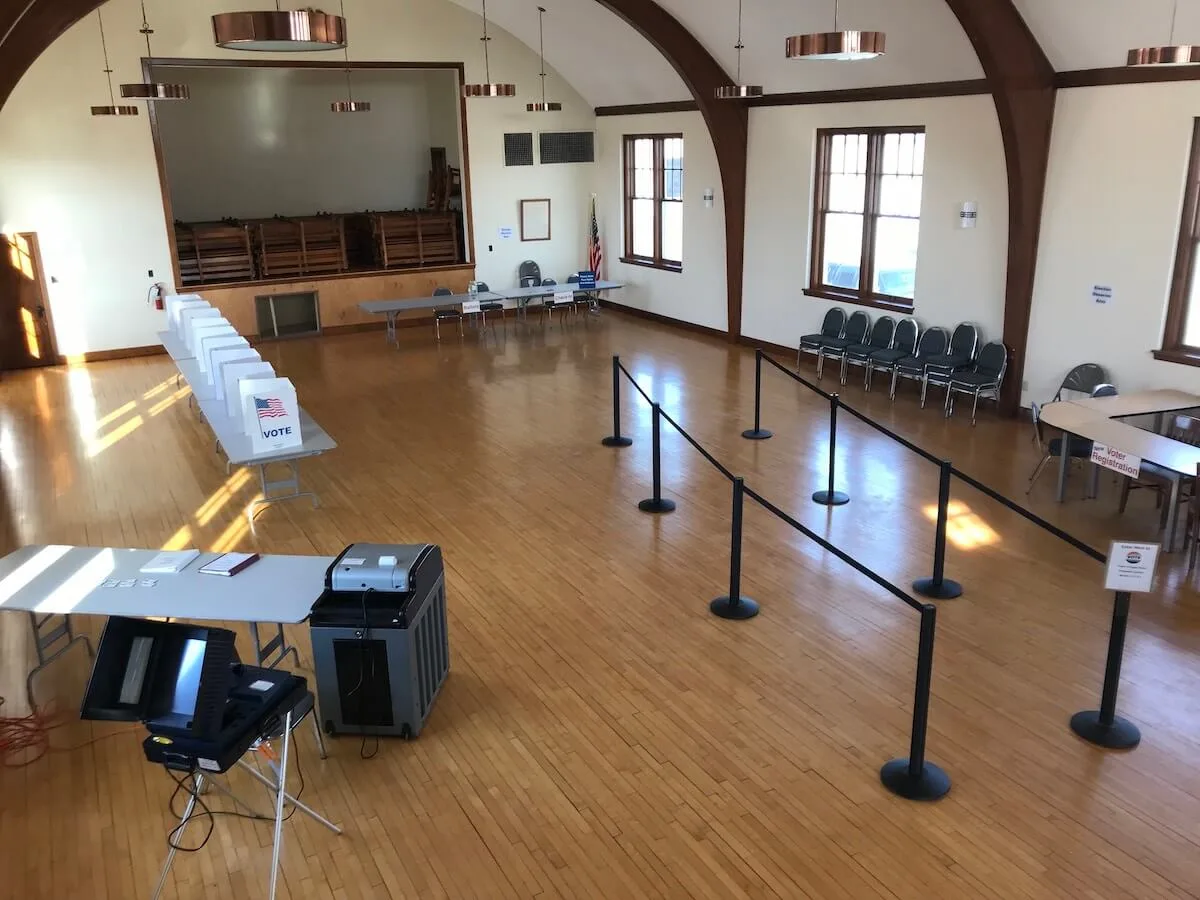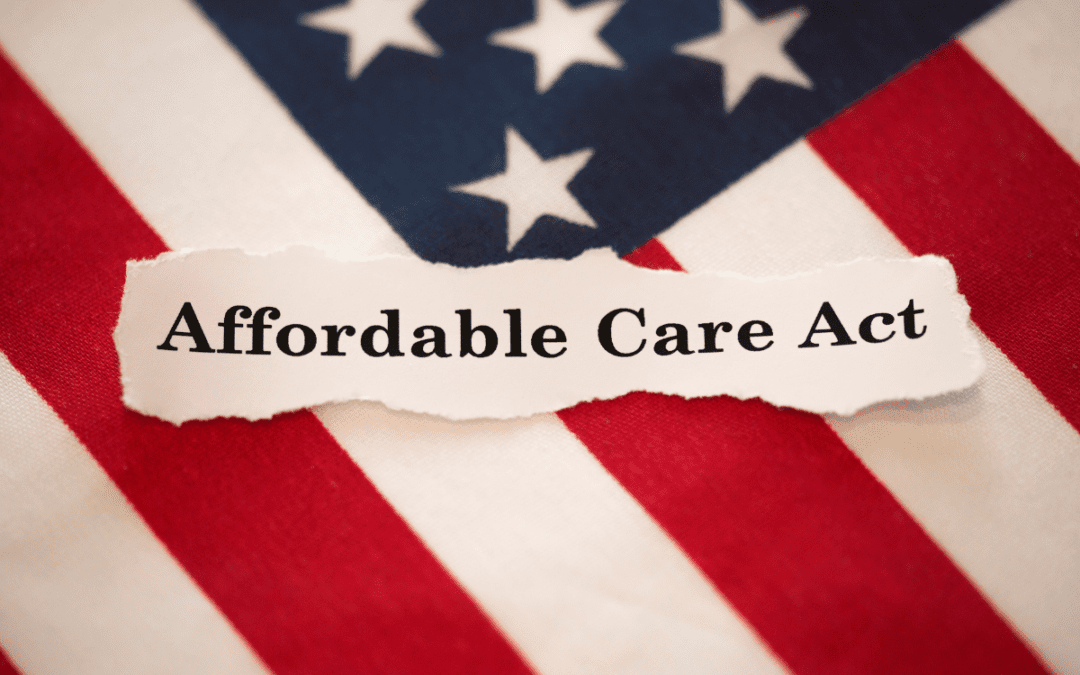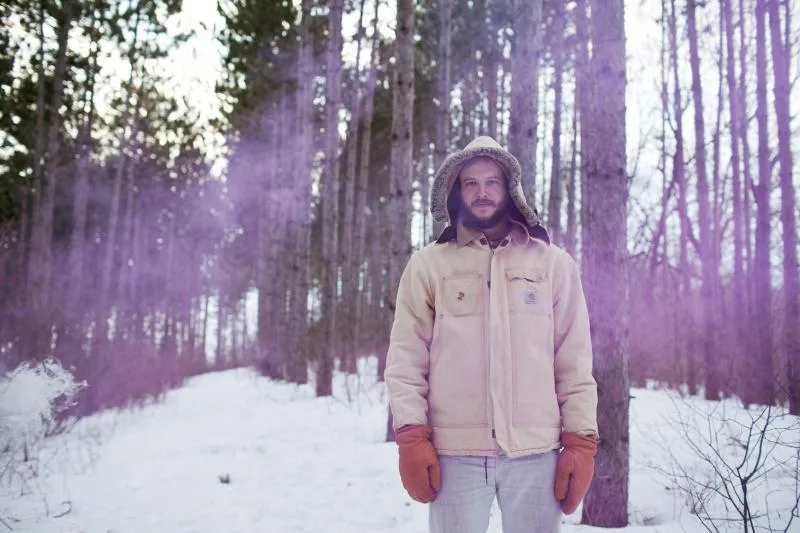
FILE–Voting booths are set up in the town hall in the Chippewa County town of Eagle Point. (Photo by Pat Kreitlow)
Conservative attacks on crime, race, and sex and gender issues helped win some spring elections, but voters in other Wisconsin communities rejected social issue challenges.
Neither a deadly pandemic nor a death threat could keep Tim Nordin from running for re-election for his seat on the Eau Claire school board. Neither could national attention from right-wing media or angry crowds that required a police presence at three different board meetings over the past few months.
“We can’t bow to fear tactics,” said Nordin. “We can’t let false narratives about race and about identity be a part of where we are in public schools. We can’t let people who are trying to tear down our public schools, attacking our teachers, have power.”
Nordin’s determination to overcome these attacks was mirrored by fellow school board member Marquell Johnson. Johnson, who is Black, also made public an email he received that called for a “Thank You White People Day.”
This sort of ugliness took center stage all across Wisconsin. Ballotpedia, which tracks election data, found that there were at least 53 school board elections in Wisconsin in which candidates took a stance on how race is taught, how schools or districts responded to the pandemic, or school-related sex and gender issues.
But Eau Claire is an example of a place where voters rejected these tactics, turning back three conservative challengers who put an emphasis on social issues—even creating a national fury over a “Safe Space” staff program on how to deal with students who have sex or gender concerns. Nordin, Johnson, and educator Stephanie Farrar won the three board seats on the ballot.
“I had some very tense conversations with community members,” said Farrar. “Particularly regarding the Safe Space training that was misrepresented by some to create controversy and drive a wedge between parents and teachers. In those conversations, I drew on my identity as a teacher–especially the disposition of listening and responsiveness–and I was able to find common ground with some people who initially had really negative perceptions.”
In other districts, however, conservative candidates won their local races, as stirring up anger about social issues and pandemic safeguards—an effort fueled by big money Republican and right-wing donors—proved effective.
This all-out culture war approach was most successful in Milwaukee’s suburbs, as well as Wausau and Kenosha, where conservative candidates won school board seats.
“The pattern was traditional GOP areas, the endorsed candidates did well,” said Michael Ford, an associate professor of public administration at UW-Oshkosh who studies school board races. The results also show that key voters in Milwaukee’s suburbs, who were uncomfortable voting for Donald Trump, swung back and voted for conservatives in the school board races, he said.
In Holmen, a social media post in February showed a flyer asking voters to contact two conservative candidates for school board to “Keep Holmen Schools White and Christian.” In La Crosse, both county political parties endorsed slates of school board candidates—and the GOP-backed candidates emphasized opposition to what they called a “divisive race-based curriculum.” They lost to a slate of candidates backed by the local Democratic Party and educators, as did the conservatives in Holmen (who also denounced the racist posts endorsing them).
But because the results around Wisconsin were a mixed bag of wins and losses, Nordin expects conservatives will continue to hammer away at issues intended to divide—rather than focus on education and other pressing issues. Crime is also expected to be a reliable Republican theme.
“As we watch the news across the state, and particularly across the nation right now, it seems that especially transphobia and laws attacking the LGBTQ community are too often being put into place,” Nordin said. “The Legislature here in Wisconsin passed its own version of Florida’s ‘Don’t Say Gay’ bill. And thankfully, we have a governor who’s an educator and knows enough to veto those sorts of things.”
“I don’t pretend to know the answer for the rise in hate directed at LGBTQ individuals, especially school children,” Farrar said. “But I am glad that the results of the vote rejected that rhetoric in favor of inclusive schools.”
State Democratic Party Chair Ben Wikler was buoyed by the results, saying Republicans should have performed better in a year that is supposed to favor them—and it only reaffirms how close and critical the fall campaigns are expected to be.
“What we saw [Tuesday] night is a sharply divided state that’s likely to come down to the wire in the fall,” Wikler said.
In the meantime, educators hope to get the focus back on educating—which is more than just reading, writing, and arithmetic, they say. Schools have always been something more to students, many of whom have difficult home lives or questions they don’t feel comfortable asking beyond the teachers they trust.
“Our focus is going to be primarily on how do we meet kids where they’re at and provide them with the supports to excel in their learning—and excel in their growth as people,” said Nordin, who hopes to continue as school board president. “We have to take care of that whole child and help them to move forward.”
Farrar said candidates this year would do well to seek respectful conversations where concerns can be heard and where myths or misunderstandings can be confronted.
“I drew on my identity as a teacher—especially the disposition of listening and responsiveness—and I was able to find common ground with some people who initially had really negative perceptions,” Farrar said. “Listening to what someone is afraid of, and having a clear, honest response is sometimes most effective.”
The Associated Press contributed to this story.
Politics

6 terrifying things that could happen if the Comstock Act is used to target abortion
Does 1873 sound like a really, really long time ago? Well, that’s because it is—but if Republicans and far-right anti-abortion activists have their...

Opinion: Many reasons why young adults should refuse to let Republicans kill the Affordable Care Act
In this op-ed, University of Wisconsin Medical School student, Samantha Crowley, shares the importance of young adults protecting the Affordable...
Local News

Stop and smell these native Wisconsin flowers this Earth Day
Spring has sprung — and here in Wisconsin, the signs are everywhere! From warmer weather and longer days to birds returning to your backyard trees....

Your guide to the 2024 Blue Ox Music Festival in Eau Claire
Eau Claire and art go hand in hand. The city is home to a multitude of sculptures, murals, and music events — including several annual showcases,...





